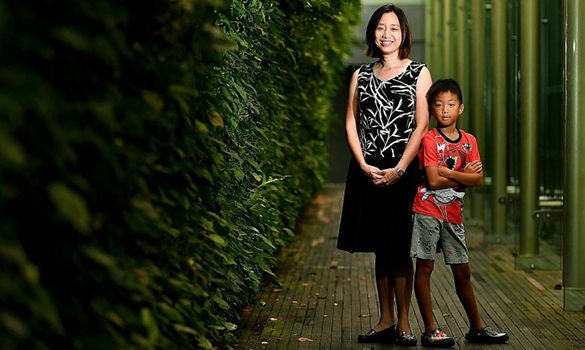
a Primary 2 pupil, at the National Gallery Singapore yesterday. Ms Er has been a Gusto mum since 2009. Gusto was started in October 2008 to study how conditions in pregnancy and early childhood influence the health and development of women and their children. More than 85 per cent of the 1,247 women and their families continue to take part in the study. ST PHOTO: LIM YAOHUI
Teacher Er Siew Shin, 39, and her eight-year-old son, Goh Yun Wen, a Primary 2 pupil, at the National Gallery Singapore yesterday. Ms Er has been a Gusto mum since 2009. Gusto was started in October 2008 to study how conditions in pregnancy and early childhood influence the health and development of women and their children. More than 85 per cent of the 1,247 women and their families continue to take part in the study. ST PHOTO: LIM YAOHUI
Researchers share findings on academic performance as well as eating behaviours
An ongoing 10-year-old study that tracks mothers and their children from birth has found that the pre-academic performance of four-year-olds has a strong link to their performance in the early primary school years.
This preliminary finding, along with others on children's eating behaviours and mothers' mental health, was shared yesterday by researchers from the Growing Up in Singapore Towards Healthy Outcomes (Gusto) study.
Gusto was started in October 2008 to study how conditions in pregnancy and early childhood influence the health and development of women and their children.
More than 85 per cent of the 1,247 women and their families continue to take part in the study.
The children were tested on things such as memory, vocabulary and numeracy skills, as well as their impulse control at age four, with their school performance also tracked later on, said Professor Chong Yap Seng, the founder and lead researcher for the study.
The aim is to target children who are at high risk of being poorly prepared for school and get parents to adapt to their learning styles, he added. He hopes the study can continue to track these children until they have taken their Primary School Leaving Examination
Another finding was related to children's eating behaviour.
"We videotaped the children eating in the lab, and we found that if they ate fast, chewed less and the food spent less time in their mouth, they ate more overall," said Prof Chong, executive director of the Singapore Institute for Clinical Sciences at the Agency for Science, Technology and Research.
The Gusto study is a collaboration between the institute, KK Women's and Children's Hospital, National University Health System and the National University of Singapore.
Prof Chong advised parents to encourage their children to eat slowly and not to force them to finish their food if they are full, as research has shown that children's eating rate is set at four years old.
Another result shared was that women with symptoms of possible depression - not just those with depression - were more likely to have babies with neurodevelopmental disorders like anxiety, depressive or disruptive behaviour disorders, said Dr Cornelia Chee, director of the Women's Emotional Health Service at the National University Hospital (NUH).
This result prompted two new studies to better treat mental health conditions in mothers.
The first, Promoting Parental Emotional Health to Enhance Child Learning, aims to screen and treat more of the highest risk group of low-income mothers with depression. It was launched in August and will run for two years.
The project received $200,000 in funding from the President's Challenge and aims to reach out to 40 such mothers from NUH each year, said Dr Chee.
The second study, Mapping Antenatal Maternal Moods, will pinpoint early symptoms of mood disorders in expecting mothers.
Conducted by the Singapore Institute for Clinical Sciences and NUH, the study will start early next year and involve up to 2,500 mothers.
Gusto celebrated its 10th anniversary at the National Gallery Singapore yesterday, with President Halimah Yacob as the guest of honour.
The study has yielded 193 papers published in scientific journals.
Teacher Er Siew Shin, 39, who is in the study with her son, Goh Yun Wen, eight, finds it useful that his development is being tracked.
"From an allergy test done, I know what he could be allergic to, and I've also been trying to limit his screen time during the school term," she said.
Author: Felicia Choo
Source: The Straits Times, Singapore Press Holdings Limited. Reproduced with permission.
Contributed by














 Get it on Google Play
Get it on Google Play